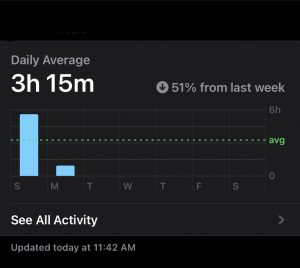Social media fuels uncivil discourse
Photo reprinted with permission Sylvia Sterton
Senior Katie Kangas is a Layout Editor-In-Chief for the Pony Express Newspaper. Kangas is passionate about how civil discourse is changing because of the use of social media, polarization of politics and the lack of grace people have for each other.
February 27, 2022
While certain aspects of discourse have stayed the same over time, during the last few years, the way people talk to each other has become more hostile because of the use of social media, the polarization of politics, and a lack of grace for other people.
The language used surrounding politics, and the power one feels when behind the mask of social media has changed the way humans interact with one another and the way they speak to each other. Unfortunately, both of these aspects have greatly added to the continuing loss of civil discourse.
The seemingly ever growing rift of the use of civil discourse is fueled by the use of social media, and the ability people have to hide behind a screen.
People on social media “can get pulled into factions pretty easily, how they kind of tend to be more extreme in their views when they’re with others who have extremist views and I think that happens on a small scale in that groupthink attitude,” government teacher Matthew Bergquist said.
When on social media, people tend to follow other accounts or users that have similar ideals to themselves. This creates an echo chamber effect for everyday users, where people only hear ideas or opinions that validate their own. Rather than getting a diverse group of perspectives, which makes a person’s opinions more moderate overall because they are willing to listen to others, users of social media become more extreme in their opinions, only adding to the growing divide in discourse.
Another factor of the shift from civil to non-civil discourse is the polarization of politics and the way politicians present themselves that influences how the general public talks about politics.
Journalism and yearbook teacher Laurie Hansen said she has noticed in the classroom that students are less willing to share their own opinions about politics and controversial topics. Students used to willingly have spirited discussions about politics or share whether they were a Democrat, Republican or an Independent and that it is something important for students to learn.
The idea of America being split into factions based on political parties is extremely prominent at this time in history. Because of the how politics are now presented in media and in general, it has become almost taboo to talk about which side of the political spectrum a person connects with. The fear around this subject makes it hard for anyone to talk about political opinions because there seems to be no forgiveness or understanding, making it harder to have civil conversation.
A growing factor to the continuing divide is a lack of grace for other people. Cancel culture and other similar types of trends are only growing the divide between different groups of people. With a lack of grace for others mistakes it only makes people scared to they will not be able to have a civil discussion.
“There’s a lack of grace. Grace allows people to have conversations and make mistakes and be corrected and be forgiven,” cultural lesion Cornelius Rish explained.
With no grace for others, people have a constant fear of saying the wrong thing at the wrong time. It is almost like anyone can be canceled for anything they say or if a quote was taken out of context. There needs to be more grace and forgiveness for how people talk to each other in order for there to be civil discourse.
Although there are so many negative to how civil discourse is changing, some believe the use of social media and politics does have some positive effects. Such as the spread of positive information and the ability to do good by making legislature that can help people. Although this is a valid point, the use of social media and politics with a lack of grace continues to deepen the divide of discourse.










Ava Stein • Mar 21, 2022 at 7:19 pm
I learned so much from your story! I can tell how much research, time, and dedication you put into this. Your sources and quotes support your idea well, making it an even stronger story.
Laurie Hansen • Mar 16, 2022 at 4:04 pm
Well done, Katie!